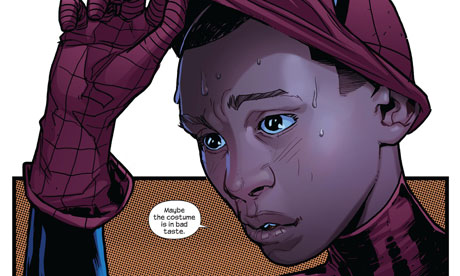But evidently this is not as uncommon as I had previously imagined. I casually mentioned this to a friend and how I was trying to figure out how I felt about it, and he informed me that Marvel is actually hella diverse in its superhero portrayals. One of the incarnations of The Green Lantern was black, and there was a Black Panther before the Party (though the "Jungle Action" and "savage" themes are a bit problematic, don'tcha think?). A little more digging showed me that various incarnations of Spiderman and Co. have been getting more and more diverse for a while: in 1992 the company released a miniseries entitled Spiderman 2099, in which Spidey was half-White and half-Latino, and the Spider Girl that was introduced in 2005 is a Latina by the name of Anya Corazon. And sure, while my main superhero experiences in life have been admiring Whites superheroes on the silver screen, I certainly remember Halle Berry as the Black Catwoman (damn that woman is sex on a stick, but again with the animalistic thing. Larger questions: why are so many superheroes based on animals? What is this weird fascination with invincible half-man-half-beast creations, especially when those creations are also supposed to be sex objects? Bestiality isn't cool...), and some lesser appearances on the small screen: the Power Rangers usually had at least one token member, Captain Planet's Planeteers were pretty diverse, and the gritty urban qualities of the Ninja Turtles always made them seem kind of Black in my mind.
So the question is, in light of all these cultural representations to the contrary, why do I think "White" when I think "superhero?" Why did I see Racialicious's article about this and think, "Hmm...that's interesting," rather than "Damn, it's about time?" like I did when Disney finally announced its plans for a Princess of African descent? Why was I not bothered by the dearth of mainstream superheroes of color? One of the Ultimate artists was quoted as saying
"Maybe sooner or later a black or gay — or both — hero will be considered something absolutely normal,”and while this is obviously something I'm in very strong support of, I just think it's crazy that I didn't recognize a need for it. The nerd-by-day, hero-by-night trope familiars like Peter Parker, Clark Kent (omg I lusted SO HARD after Tom Wellings on Smallville when I was in high school; I'm not even gonna front--oh hey, and the hottie from the Famous Jett Jackson grew up to be Cyborg on Smallville for a hot minute), and even the kids from Kick Ass was something I could buy into and identify with regardless of race. And don't get me wrong, I think that's fantastic...but not when it stands in the way of me seeing larger problems in popular culture. Anyway, I applaud Marvel for their [evidently consistent] efforts to diversify and dig themselves out from under the mountain of white privilege their characters have simply by having been created in a time when that shit was PC.
Sigh, except some people evidently still think that shit is PC, because this is already an internet meme:
 |
| Evidently some people are still scared of men of color in masks... |
PPS: THE BEST THING I'VE SEEN ON THE INTERNET REGARDING THIS ENTIRE TOPIC:
"And really, there’s nothing new about people of color receiving disproportionately exposure to environmental radiation and medical experiments. A few good superpowers is the least they deserve." --Channing Kennedy for ColorlinesMore truth is in that statement than I can possibly get into right now, so I'm gonna...uh...*drops mike, walks away*
Hey Maya, I'm probably the biggest closet comic-book nerd you know... I don't like the move. For me, it has nothing to do with race; it's the fact that someone else is Spider-Man. The thing is that Peter Parker is Spider-Man and it's a mythological thing. It's like someone else becoming Superman. Moreover, this new kid is coming out of nowhere. It's not like the new Batman or new Captain America where the guys were the sidekicks beforehand. It just feels too forced, but then again... it is the Ultimate Marvel Universe in which the editors take more risks.
ReplyDelete